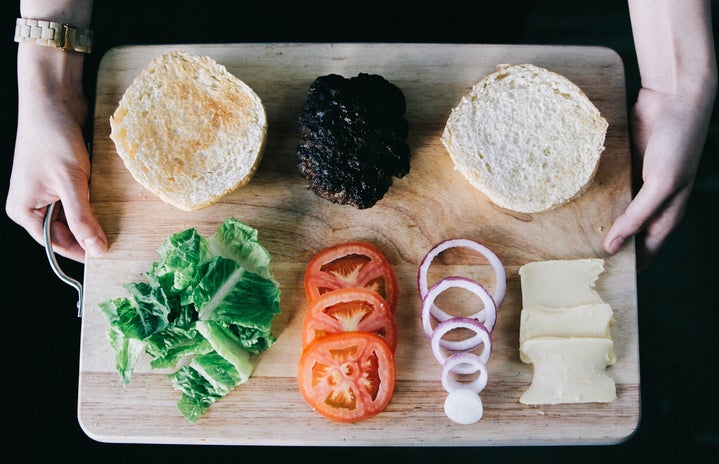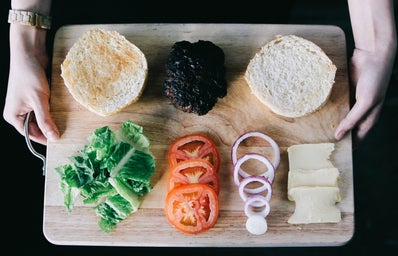Are you a broke vegan or aspiring plant-based eater? Do you often struggle to afford a vegan diet on a student budget? Is your bank account screaming right this very moment? Well, you’re not alone. Trust me, I’ve been there. It’s hard out here in these vegan streets. I too have been a broke, busted and disgusted vegan student who wondered how I could pay all of my bills and keep my diet free of animal products. Over my eight years as a dietary vegan, I finally uncovered the secrets of cost-efficient vegan eating. So, have no worries! Today, you will be provided with 6 foolproof tips to being a vegan on a budget.
1. Stock up on dried staple foods
Dry foods are generally cheaper than boxed, premade or canned foods. They are often less expensive than fresh produce as well. Dried foods like rice, beans, and oats are healthy, protein-dense, nutritious foods that are cheap AF. You won’t have to stress out your wallet by sticking with them. Once cooked, add the beans to soups and salads or mash them into spreads for your sandwiches. Hummus is a gift from the vegan gods, if there ever was one. Also, dried foods are more shelf-stable than fresh produce, so they will last longer in your dorms and apartments without going bad. Less food waste equals fewer dollars wasted, so keep your pantry stocked with dried foods and your money in the bank.
2. Cook your own food
It may sound like a hassle at first, but cooking your own meals will save you tons of cash in the long run. Cooking at home is astronomically cheaper than eating out on a day to day basis, especially with the outrageous prices of many vegan restaurants. Cooking at home is also healthier for you in the long run since you can control the ingredients and portions. So, as hard as it may seem, you’ve just got to set aside some time to get in the kitchen with your wrist twisting like a stir-fry (whip it).
3. Food prep for days
Section out one day a week to spend an hour or two cooking enough food for the week ahead of you. Not only does this free up some time you’d otherwise spend cooking during the week, but it can also save you some money on your next grocery bill. Planning out your meals before you go grocery shopping will reduce the money you end up wasting on foods you never got around to eating. You’ll have less food waste, more time on your hands and healthy vegan food in your bellies.
4. Chill out with frozen fruits and veggies
Frozen foods are usually much cheaper than fresh produce. While processed frozen pre-made meals can be full of salt, preservatives and disappointment, single-ingredient frozen fruits and veggies are healthy and additive free! Frozen foods last an eternity in your freezer, minimizing that dastardly food waste and are a convenient way to jazz up your meals. There’s no chopping or prepping needed. Simply add frozen strawberries to your morning smoothies, frozen spinach to your nighttime soups and stews, frozen corn to your burritos, etc. The possibilities are endless and so delicious. Keep that freezer stocked and you’ll be pop-locking and dropping it at the sight of your happy bank account.
5. Hit up your local Dollar Tree (Yes, I’m serious)
First of all, Dollar Tree has been off the chain lately. The store has greatly upgraded it’s food and snack selections to include a lot of yummy vegan treats. In addition to all of the treats, condiments and main ingredients are there for only a dollar a piece. I buy ketchup, rice, beans, and frozen blueberries at Dollar Tree all the time. It’s the perfect place for broke Betty’s to stock up their pantries on a budget. Keep an eye out for non-vegan ingredients if you plan to buy any processed foods there, but if you’re looking for single-ingredient foods then you shouldn’t have to worry. So, now that you know, don’t sleep on Dollar Tree.
6. Simplify your pantry and grocery list
My single best tip for being vegan on a budget is to cut out all the unnecessary and expensive vegan foods like chia seeds, hemp hearts, spirulina, mock meats, dates, etc. Seriously. Nobody needs twenty-dollar acai powder. These pricey foods are often promoted to vegans as necessary but are anything but. They are costly, needless, and often difficult to find. It can be easy to get caught up in all the fanfare of health food stores and organic blog cooking tips, but if you stick to the basics with simple ingredients that are inexpensive and easy to find, your wallet will thank you.
So there you have it, 6 helpful ways to eat a vegan diet on a broke student budget. Customizing and utilizing these tips should help you save some cash on all of your vegan eats. May your vegan dollars smile upon you, and may you never have tumbleweeds in your wallet again.


